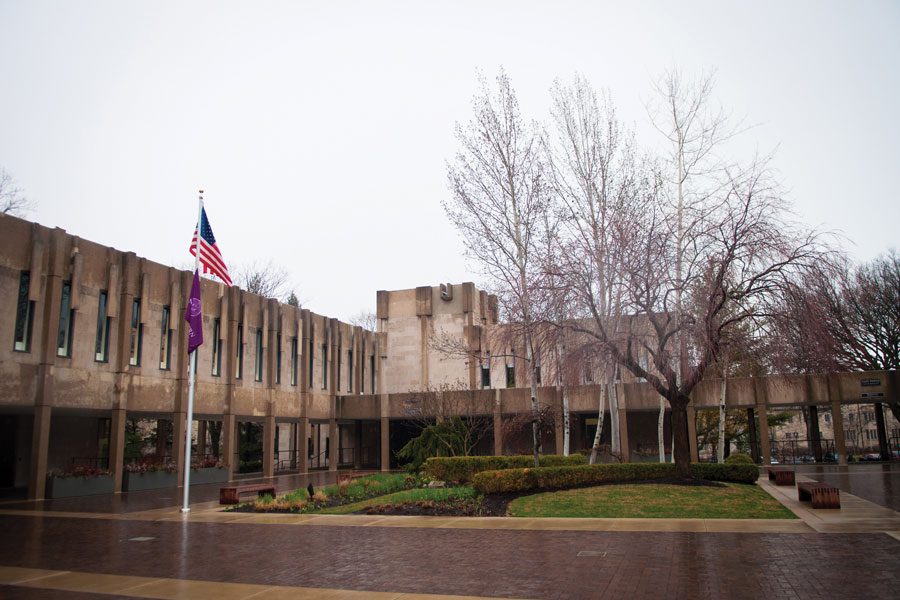Provost’s Office talks potential fall academic calendar scenarios at Faculty Senate meeting
Daily file photo by Daniel Tian
Rebecca Crown Center, home to the Office of the Provost. At a Wednesday evening Faculty Senate meeting, representatives from the Office of the Provost shared various plans for fall instruction.
June 4, 2020
Northwestern’s Faculty Senate discussed potential Fall Quarter academic calendar scenarios and classroom capacity at its monthly meeting Wednesday.
Representatives from the Office of the Provost unveiled classroom capacity analyses and three academic calendar adjustments reflecting the impacts of COVID-19 that could potentially change the structure of on-campus instruction.
As of today, the University has not announced a policy regarding Fall Quarter instruction.
Mark Francis, associate provost for operations and facilities, said classroom capacity adjustments for Fall Quarter — should classes be held on campus — will directly prioritize health and safety and maintain social distancing guidelines. Seminar and flexible seating classroom capacity will be largely reduced, he said, to a fraction of original capacity.
“The impact is, of course, significant because in many cases you can see that we’ve abandoned whole rows because we cannot achieve a 6-foot radius,” Francis said. “Of 128 Registrar-controlled classrooms, 44 are deemed usable for a typical classroom setting.”
In lecture halls such as Tech L171, Francis said classroom seating capacity would be reduced by about 85 percent to accommodate for a 6-foot radius between students — in this case limiting seating capacity from 292 to 46. No lecture halls or classrooms on campus will be able to accommodate 157 or more students, he said.
Jacqualyn Casazza, associate provost for University records and the University registrar, said most fall classes will likely be offered remotely since many lecture halls cannot accommodate the number of students enrolled in a course. She said classes may be synchronous or asynchronous, keeping in mind that some students and faculty may not be able to attend or host in-person lectures even if they are offered.
Before presenting three possible scenarios for fall instruction, Casazza emphasized that federal financial aid regulations require 30 weeks of instruction — including exam periods — per regular academic year, and no fewer than nine weeks in a quarter. She added the University does not begin terms on major religious holidays, so it is making “every attempt” to schedule around Rosh Hashanah and Yom Kippur for required orientations.
“As you’ve probably heard from peers around the country, universities are really making an attempt to send faculty and students away from campus before Thanksgiving,” Casazza said. “That’s really the motivation behind these scenarios.”
Scenario A for the fall suggests an 11-week quarter that starts on Sept. 16, one week earlier than planned, with exams held remotely the week after Thanksgiving. Casazza said this would allow for students to leave campus and complete the quarter before flu season begins. It would also eliminate the need for students to travel twice, which she said would reduce costs and risk of bringing COVID-19 back to campus.
Philosophy Prof. Baron Reed spoke in favor of this scenario — the longest quarter of the three proposed calendar options — because he said it would help campus return easiest to “life as we used to know it.” He added that a longer period allows for the most flexibility in scheduling.
SESP Prof. Lilah Shapiro said she understands the desire to stick with the first scenario because it most closely parallels the familiar academic calendar and provides the most time for instruction. However, she voiced concerns that this scenario would eliminate reading week, meaning students would have to prepare and study for exams over Thanksgiving break.
“I have a lot of concerns about that in terms of the abilities for students to meaningfully focus during that time and be mindful of their need and right to be able to take a step back and spend time with family,” Shapiro said.
Scenario B would also start fall instruction early on Sept. 16, but end the term after nine weeks of traditional instruction and administer final exams from Friday, Nov. 20 to Tuesday, Nov 24. This means the quarter would end before Thanksgiving, Casazza said, but would require students to potentially take final exams over a weekend.
English Prof. Helen Thompson said the responses received by her constituents suggest that if “quality,” or ABC-scale, grades return in the fall, they advocate for a return to reading week prior to exam week. She said the first scenario would be her constituents’ preferred option because, unlike the second, it would not “compress” finals over a weekend.
Scenario C would start Fall Quarter on Sept. 21, one day earlier than planned, with eight weeks of traditional instruction and exams held during the third week of November — ending the quarter on Nov. 20. Casazza said this would shorten the quarter by almost three weeks compared to a typical fall.
Neurobiology Prof. Fred Turek asked whether remote classes in the fall would still necessitate an on-campus presence of students and faculty.
Miriam Sherin, associate provost for undergraduate education, said most underclassmen — who have a two-year live-in requirement — would be expected to live on campus and still take remote classes if the potential hybrid model is imposed. As social distancing restrictions lessen in the state, she said the opportunities for in-person instruction and activity will likely increase.
“We really aim to preserve what’s best about the Northwestern residential experience,” Sherin said, “while continuing to leverage our rigorous academic experience.”
Email: [email protected]
Twitter: @isabellesarraf
Related Stories:
— Schapiro talks fall quarter, admissions and #StopAdani in ‘Conversations with the President’
— Northwestern Faculty Senate talks financial impact of COVID-19, uncertainties around Fall Quarter
— In interview, Interim Provost Kathleen Hagerty talks fall quarter












